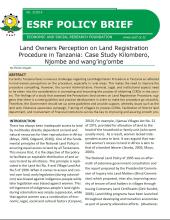Land Library
Welcome to the Land Portal Library. Explore our vast collection of open-access resources (over 74,000) including reports, journal articles, research papers, peer-reviewed publications, legal documents, videos and much more.
/ library resources
Showing items 1 through 9 of 58.The SPR 2015 provides a management record of sector progress over the financial years 2006/07-2014/15, identifying issues arising, as background for an analysis of main challenges for the sector.
The Ministerial Policy Statement is structured by Vote, as follows:
• Staff Establishment Structure Provides details of approved staff structure for each programme and project (including names of staff and vacant posts).
This is clearly demonstrated in the form of an organogram.
Madam Speaker and Honorable Members, the vision of my Ministry is “Sustainable Land Use, Land Tenure Security, Affordable, Decent Housing and Organized Urban Development”.
Currently Tanzania faces numerous challenges regarding Land Registration Procedure in Tanzania as reflected in land owners perceptions on the procedure, especially in rural areas. This makes the need to improve the procedure compelling.
Madam Speaker and Honorable Members, the vision of my Ministry is “Sustainable Land Use, Land Tenure Security, Affordable, Decent Housing and Organized Urban Development”. The Mission is “To ensure sustainable land management, planned urban and rural development and decent housing for all”.
Currently, Tanzania faces numerous challenges related to land ownership, especially in rural areas. The challenges include farmers-pastoralists conflicts, tenure disputes, and alienation of peasants.
The economies of many countries such as the Gulf and Southern African States are to a considerable extent sustained by financial flows from extraction of mineral resources and fossil fuels.
After three decades (following independence) of being overwhelmed by command-economy policies, in the 1980s the Tanzania’s gold mining industry benefited from policy reforms that started with the economic recovery programmes (ERP).
In light of persisting land use conflicts and marginal productivity on village lands, a research in the captioned topic was deemed necessary.







